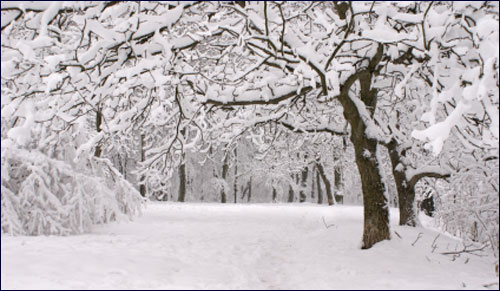 Vampire Weekend's Surprising Jewish Stories
Vampire Weekend's Surprising Jewish Stories


5 min read
How to use this unique period for spiritual growth.
Who do I complain to?
That was my first thought on hearing the extreme weather that I – like much of the United States and Europe – was in for. As we braced for the “polar vortex” – the very name sounded like something from a disaster movie – of freezing cold air that was to grip much of the US, I felt there must be some way to object.
After all, when other things go wrong, I’m often quick to protest. If I’m not happy with conditions, I’m not shy about speaking up.
The prospect of enduring temperatures fifty degrees below freezing – with wind chills up to a hundred degrees below freezing – seemed like a crazy a mistake. If only there were a way to object, I thought – to explain this couldn’t be – the extreme weather heading our way would stay away.
Instead, we woke up in the middle of the night as strangely loud bangs and snaps echoed through houses – mysterious sounds caused by the newly frigid air. Going outside even for a few minutes was dangerous: frostbite could occur in as little as five minutes in such low temperatures. When I dashed outside to check for damage, the very air felt different: not cold, but intensely burning instead.
On that first fifty-degree-below freezing morning, I drove my husband to the train station, skidding on the slick ice. When I returned home shaky, my kids complained that they were freezing, despite our heating being on. I thought of our elderly furnace in a panic: if it were to give out, we’d be in serious trouble.
I’d rarely been so aware of weather before. It seemed wrong, as if I suddenly didn’t recognize an old friend. Schools and offices shut down, and millions of people stayed home, afraid suddenly to do something as simple as venture outside. Mishaps like a broken heater or faulty electricity suddenly were transformed into potentially deadly crises.
Here are four ways to use this unique period of arctic conditions for growth.
In our modern world – when complaints or repairs are often just a phone call away – it can be startling to come up against conditions we can’t control. It’s so easy to get lulled into the sense that we are in charge of our surroundings: when we buy food in the supermarket, it’s hard to recall that it took the gifts of sunlight and rain to grow the crops that made our meals; when we control our temperature and light with the flick of a switch, it can be hard to keep in mind just how lucky we are to have a livable environment at all.
Extreme weather can be a gift, reminding us of the preciousness of those ordinary days we take for granted, when we don’t have to worry about our well-being, when our safety and comfort are assured. Take a moment to think about the blessings in your life you ordinarily take for granted – for the blessings you are enjoying today, despite the brutal temperature and uncertainty and inconvenience – and and allow yourself to feel the gift of gratitude.
During a massive blackout in Los Angeles in 1994, hundreds of people reportedly called 911, reporting a mysterious giant silvery cloud hovering in the night sky. The cloud turned out to be the Milky Way.
Sometimes it takes a colossal event like an ice storm or a blackout to realize how huge and awe-inspiring nature is. As frightening as these events can be, they can also be a gift: a way to shake off our ordinary life and look at the world – in all of its beauty and complexity – afresh.
It’s too cold in much of the northern hemisphere to go outside right now, but even looking at the glint of sunlight on snow – and a thousand other beautiful scenes – can help sooth our souls and appreciate the beauty of the world around us.
During this period of freakish weather, look for ways to give. Do your neighbors have sufficient heat? Do they need groceries, or help clearing snow, or just company?
Looking outside ourselves increases our emotional resiliency: it helps us to cope better with the challenges we face, and allows us to connect with and elevate others. It can sometimes feel difficult to be able to give to others: extreme conditions can make it easier to break down barriers and offer to help.
If you’re one of the millions of people unexpectedly facing altered plans today, take a moment to reframe before you continue with your day. Amidst its many inconveniences and hardships, this day is also a gift.
Whether it’s a day staying home with your children who are off of school, or telecommuting, or being home alone, resolve now to experience this day fully. What new tasks do you want to try? Consider learning or reading something new, or reaching out to a person you might not normally contact.
Perhaps the best way to pull out of the polar vortex is by clinging to the warmth of your soul.
